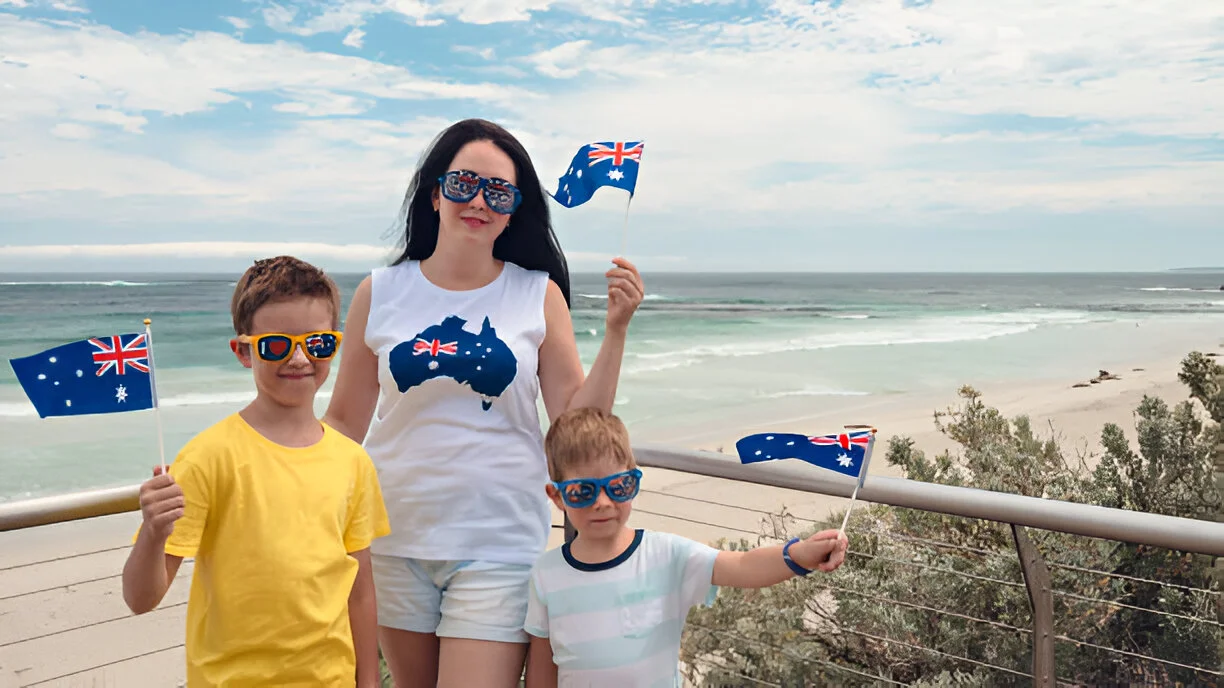
What is Australia Family Visa?
Australia has long been an advocate for family migration and the blending of diverse ethnic groups in order to strengthen the country's economy and social fabric. It's a chance for families to settle down and build a life for themselves in this nation. This is why the Australian government's Department of Home Affairs provides several family visas - whether temporary or permanent - to allow citizens and permanent residents to bring their parents, spouses, and children to Australia. Citizens of Australia and New Zealand who meet the eligibility requirements can sponsor one another for one of these visas.
Different Types of Australia Family Visas
The sponsoring individual has several options for family visas that allow them to bring their dependents and family members to Australia:
- Partner visa
- Prospective marriage visa
- Parent visa
- Child visa
- Other family visa
- The applicant must be the husband, fiancé, or de facto partner of someone living in Australia.
- Both parties must be at least 18 years old.
- The ability of your spouse to sponsor you for a minimum of two years is required.
- Married couples must provide evidence that their relationship has been valid for at least twelve months in order for their marriage to be recognized by Australian law.
- De facto partners are required to provide evidence of a relationship of at least one year's duration.
- You need to present ample evidence to validate your relationship.
- Personal integrity and physical fitness standards must be met.
Partner Visa (Temporary and Permanent)
Spouses and de facto partners of Australian citizens and permanent residents are eligible to apply for the Partner Visa for Australia, also known as Subclass 801. Anyone who is married to, same-sex with, or engaged to an Australian citizen or qualified New Zealand citizen is eligible for the visa. Your partner must have been a permanent resident of Australia for at least two years before you apply for a Partner Visa.
Requirements for Australia Partner Visa
If you tick all of the following boxes, you can apply for an Australian partner visa:-
Subclass 300 Prospective Marriage Visa
To marry an Australian permanent resident or citizen, a New Zealand citizen, or an eligible foreign national is one of the requirements for the Australian prospective marriage visa. You are required to wed your intended spouse within the visa's nine-month validity period. You can apply for a full-time work or go to school during this 9-month period if you have a Subclass 300 visa. Your path to permanent residency in Australia begins with a partner visa, which you can apply for after you tie the knot.
Requirements for Prospective Marriage Visa
The following requirements must be met in order to be considered for a Prospective Marriage Visa:-
- A minimum age of 18 is required for both couples.
- An Australian citizen, permanent resident, or qualified New Zealand citizen must be your fiancé in order to participate.
- The person you intend to marry or live with will need to sponsor your visa application.
- You two must have the intention of getting married within the next nine months.
- Satisfy all character and health standards.
- You are required to settle any outstanding balances with the Australian government.
Visa for Parents (Subclass S103)
Reuniting with children in Australia is made possible for qualified parents through this permanent resident visa. Your child who has already made Australia their permanent home can sponsor you for a parent visa. There are the subsets of the Australian parent visa:-
- Parent Category - Citizens and permanent residents of Australia can sponsor their parents or other family members to join them in Australia for a period of time or permanently under the Parent Category visa.
- Contributory Parent - The contributing parent visa is an umbrella term for many different types of visas and immigration schemes. This visa will allow you to remain in Australia indefinitely as a permanent resident. The balance-of-family test requires that half of your children be permanent residents or citizens of Australia before you may apply for this visa.
- In addition, the aforementioned category of permanent visas requires the submission of an Assurance of Support. Those seeking the Retirement Pathway do not have to do the same.
- Sponsored Parent - In March 2019, Australia launched a new temporary visa category called Sponsored Parent, which allows parents or grandparents to join their children in the country. While there are few restrictions on the number of years a parent can stay in Australia under the visa pathway, they are required to spend 90 days outside of Australia before they can apply for the visa again.
- Aged Parent Visa - For parents who are 65 and up who want to join their children who are already permanent residents or citizens of Australia, the government offers the Aged Parent Visa. In order to apply for this visa, the prospective parents' children must sponsor them.
Parent Visa Eligibility Criteria
In order to qualify for a parent visa to Australia, you need to:-
- Have a sponsor who is a parent or guardian of an eligible kid already living in Australia.
- Retired parents applying for this visa do not require a sponsor.
- Ensure that half of your children are legitimately resident in Australia in order to meet the balance-of-family criteria.
- Obtain a guarantee of assistance.
- Reach the minimum standards for health and character.
- Have paid off all of your outstanding debts to the Australian government, if applicable.
Visa for Children (Subclass 101)
Contrary to what one might expect, a child born outside of Australia to a citizen or permanent resident of Australia does not automatically become a citizen of Australia. A parent in this situation would need to apply for a subclass 101 child visa.
Up until the age of 25, a child can apply for a visa. Additionally, while the visa application is being processed, the potential kid is required to stay outside of Australia.
Child Visa Categories
Child visas can be broadly categorized into three types:-
- Subclass 102 Adoption Visa - This visa allows a child under the age of 18 who was adopted by an Australian citizen or permanent resident, an eligible New Zealand citizen, or both to become a permanent resident of Australia. The child must have been born outside of Australia.
- The Orphan Relative Visa (Subclass 117/Subclass 837) permits a foreign orphan under the age of eighteen to reside in Australia with a relative. The child's parents must be either deceased, disabled, or untraceable in order to petition for this type of visa.
- Dependent Child Visa (Subclass 445) - Children whose parents possess a temporary partner visa and are applying for a permanent visa in Australia can apply for a dependent child visa through the subclass 445 stream.
Eligibility Criteria for a Child Visa
- Rely on sponsored parents who are either citizens or permanent residents of Australia, or who meet the eligibility requirements to become citizens of New Zealand.
- The minor must be at least 18 years old and no more than 25 years old.
- Being a biological, adopted, or stepchild of a parent holding a temporary partner visa is a prerequisite for this visa, as is not being married or in a de facto relationship. Additionally, meeting health and character requirements is a must.
Alternative Family Visa
Caregivers, dependent relatives, and other relatives of Australian and New Zealand citizens and permanent residents are eligible for alternative family visa options. In order to permanently migrate to Australia, qualified relatives must complete the following requirements to obtain the visa:-
- A relative who is a citizen, permanent resident, or eligible citizen of Australia, New Zealand, or both must sponsor the prospective application.
- To establish a connection in Australia, the applicant needs to provide enough proof.
- Need to guarantee backing.
- Fulfill all character and health criteria.
You can apply for this visa even if you aren't in Australia. You have the option to apply for a new visa while you are in Australia if your current temporary visa permits it. The visa can only be issued if you are outside of Australia at the time of issuance.
What Makes an Other Family Visa Stand Out?
There are no limitations on the holder's ability to work or study in Australia with this visa. The candidate can use the healthcare and social security benefits available to them. After a specific amount of time has passed, the candidate may sponsor others for permanent residency and petition for citizenship of Australia.

Why Choose Nationize Visas for Australia Family Visa?
Choosing Nationize Visas for an Australia Family Visa ensures you receive expert guidance throughout the entire immigration process. Family visas, such as the Partner Visa, Parent Visa, and Child Visa, are designed to reunite families and require careful navigation of Australia’s immigration laws. With Nationize Visas, you get personalized support, detailed assistance with documentation, and professional advice at every stage of your application. Whether you're sponsoring a loved one or applying yourself, our experienced team works closely with you to increase the chances of a successful outcome, making the process smooth and stress-free.
Benefits of Choosing Nationize Visas for Australia Family Visa
- Comprehensive Family Visa Knowledge: We specialize in all types of Australia family visas, ensuring accurate guidance tailored to your specific visa type.
- Personalized Visa Strategy: We create a customized visa strategy based on your family’s unique situation, maximizing the chances of approval.
- Complete Documentation Support: We handle the entire documentation process, from gathering evidence of your relationship to submitting the visa application.
- Regular Updates and Clear Communication: Our team ensures you are informed about every step of your visa application, offering transparency throughout the process.
- High Success Rate: With a track record of successful family visa applications, we are committed to helping families reunite in Australia.
- Post-Arrival Assistance: Beyond visa approval, we offer services to help you settle in Australia, providing advice on housing, healthcare, and schooling.
People Also Asked:
What is an Australia Family Visa?
The Australia Family Visa allows Australian citizens and permanent residents to sponsor family members for permanent residency. This visa aims to reunite families in Australia.
Who can be sponsored for a Family Visa?
Eligible family members include spouses, partners, children, parents, and other relatives. Each category has specific requirements that must be met for sponsorship.
What are the eligibility requirements for family sponsorship?
Sponsors must be Australian citizens or permanent residents. They need to demonstrate their ability to support the applicant financially and provide accommodation upon arrival.
How long does the Family Visa application process take?
Processing times for Family Visas can vary significantly based on the visa type and individual circumstances. It typically ranges from several months to over a year.
Who is the best consultant for Australia Family Visa in India?
Nationize Visas is the premier consultant for Australia Family Visas in India, providing comprehensive support throughout the application process to ensure a successful outcome.


